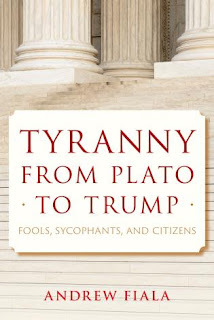 articles. He has published hundreds of op-ed essays and newspaper columns. Fiala is Professor of Philosophy and Director of the Ethics Center at Fresno State. He gives frequent public lectures on topics related to ethics, ethical decision-making, ethical leadership, peace, politics, and religion.
articles. He has published hundreds of op-ed essays and newspaper columns. Fiala is Professor of Philosophy and Director of the Ethics Center at Fresno State. He gives frequent public lectures on topics related to ethics, ethical decision-making, ethical leadership, peace, politics, and religion.
Fiala is past President of Concerned Philosophers for Peace. He is an internationally respected expert on the philosophy of peace, nonviolence, and pacifism; and a strong advocate for civility, religious liberty, and freedom of thought.
Fiala applied the “Page 99 Test” to his new book, Tyranny from Plato to Trump: Fools, Sycophants, and Citizens, and reported the following:
Page 99 of my book is found within Chapter 6, which is entitled “The Fool’s Stupidity.” On page 99 we read:Visit Andrew Fiala's website.While we might blame the foolish morons who actively participate in violence, there is another level of analysis worth considering. The fun of violence can be transformed into art and show. The spectators cheer it on in the name of amusement and fun. This point was made by Diogenes the Cynic, who called the Dionysian festivals of ancient Athens “a spectacle for morons.” Diogenes used the word “moros” here in a phrase that has also been translated as “peep-show for fools.” Perhaps we could call this “moronic amusement.” Moronic amusement includes much of popular culture, pornography, gossip, and so on. Violence and sex and rude and raunchy behavior are entertaining. Quentin Tarantino is a master of this. But before Tarantino, there was the cornball violence of professional wrestling, kung fu movies, and spaghetti westerns. Prior to that—and much more serious—were the spectacular festivals of violence associate with lynching, public executions, and the like. This is what one author has called, following Nietzsche and Foucault, a “carnival of atrocity.”This passage sums up an important part of my account of tyranny. I argue that the tyrant’s rise is facilitated by the cunning of his sycophants and the moronic urges of the mob. A key to this is violence and amusement. The mob is titillated by the tyrant’s bullying and potential for violence. This is a crucial part of my analysis. The mob is not merely coerced into supporting the tyrant. Rather, they enjoy the “carnival of atrocity.”
I argue throughout that this moronic tendency is not merely a political problem. It is more broadly a spiritual problem. We all have this tendency. The popularity of Tarantino’s movies provides a well-known example. As Tarantino once said, “violence is fun, man.” This is a sad but true statement about the human condition. It explains quite a bit: from bullying in schools and at work to the rise of tyrannical political regimes and war.
So does this pass the Page 99 Test? I think that page 99 does make manifest one of the most important claims of my book. This is a crucial part of my diagnosis of tyranny. But page 99 does not provide the remedy, which is moral education and the rule of law. So I think the page 99 test provides a mixed result in this case.
--Marshal Zeringue



